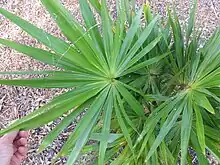| Hemithrinax compacta | |
|---|---|
 | |
| Scientific classification | |
| Kingdom: | Plantae |
| Clade: | Tracheophytes |
| Clade: | Angiosperms |
| Clade: | Monocots |
| Clade: | Commelinids |
| Order: | Arecales |
| Family: | Arecaceae |
| Genus: | Hemithrinax |
| Species: | H. compacta |
| Binomial name | |
| Hemithrinax compacta | |
| Synonyms[1] | |
| |
Hemithrinax compacta is a species of palm that is endemic to Cuba.
Distribution and habitat
Hemithrinax compacta flourishes on the mogotes of Cuba. Mogotes are dome-shaped hills in Cuba made up of coral rock. Hemithrinax compacta is the only species in its genus in Cuba that grows in the highlands, at an elevation of 450 metres (1,480 ft). Hemithrinax compacta needs to have more than 2,400 mm (94 in) per year of rainfall and a mean temperature of 22 degrees Celsius (72 °F).
Description
The leaves of the palm have an average length of 190 cm (75 in) and the inflorescence of the palm is tightly clustered, giving rise to the species name. A mature H. compacta can have a massive trunk of up to 10 cm (3.9 in) thick and more than 20 m (66 ft) in height. The genus Thrinax has been grown in gardens. In addition, in Thrinax the fruits are dispersed and eaten by West Indian woodpeckers and other birds, gray squirrels and lizards.[2][3]
References
- ↑ "Hemithrinax compacta (Griseb. & H.Wendl.) M.Gómez". World Checklist of Selected Plant Families. Royal Botanic Gardens, Kew. Retrieved 12 December 2014 – via The Plant List. Note that this website has been superseded by World Flora Online
- ↑ Morici, Carlos. "The Genus Thrinax in Cuba." Palms (2000): 63-68. 2000. Web. 3 Dec. 2014.
- ↑ "Thrinax Compacta." Thrinax Compacta. N.p., n.d. Web. 11 Dec. 2014. <http://zipcodezoo.com/Plants/T/Thrinax_compacta/#SimilarSpecies>.